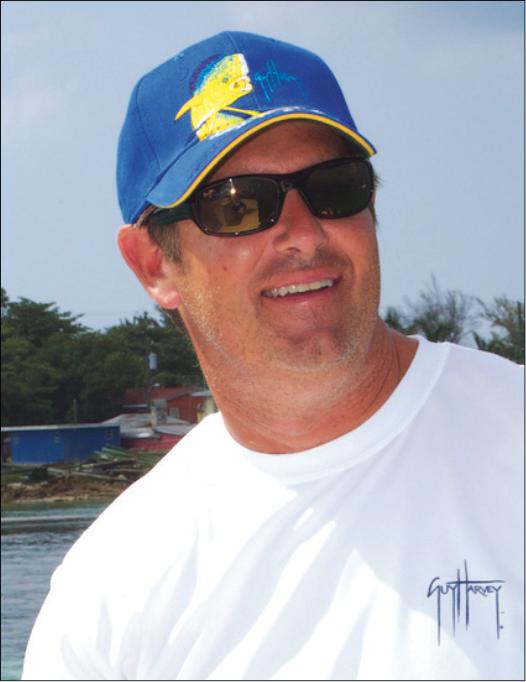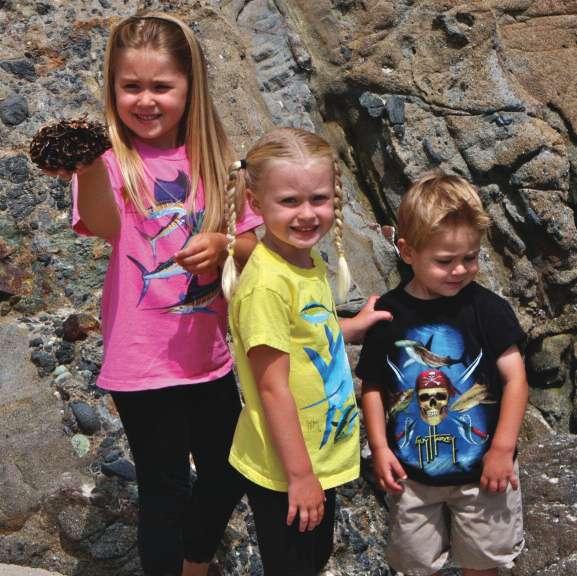
7 minute read
laSt CaSt
l a s t c a s t
f i s h in g m ov in g wat e r


Fred Garth
For the past 25 years, Fred D. Garth’s articles have appeared in numerous books, magazines, and newspapers around the world. His most recent novel, A Good Day to Live, is available online and in select bookstores. (www.agooddaytolive.com)
For me, fishing is kind of like playing the guitar. After 30 years of picking and grinning, I’ve finally achieved mediocrity. I’m a better fisherman, thank goodness; and as much as I fish, you’d think I’d be an expert. But in fishing, as with musical instruments, there’s always room to learn—another song to attempt or another species to pursue. Even the pros are on a constant vision quest to absorb more wisdom.
My wife used to wonder about the humongous, gravitational pull fishing seems to have on me. One day, I explained to her that fishing is about being one with nature. It’s about the primal hunt for food, the camaraderie of old friends, and the triumph of man over beast. And, of course, the really, really cold beer. She finally got it.
In my own fishing journey, I’ve wetted a line in oceans all over the world. This summer, I found myself upstream in the Colorado Rockies learning about water that runs. And here I must digress. I’m a saltwater guy. I once had a 50-pound amberjack pull me over the side of a boat. I’ve battled jack crevalle on light tackle until the tendons in my arm felt like week-old spaghetti. Simply put, I love the epic battle with monster fish. So the prospect of fishing for brook trout, brown trout, and rainbows was more about the nuances of nicely presenting a fly on moving water rather than having a knock-out fight.
While there’s certainly artistry in saltwater fishing, it’s nothing like dropping a fly on a roiling river. There are bushes hanging along the banks that will snag fly lures like Velcro. You have to contend with rocks, strainers, rapids, eddies, holes, log jams, and beaver dams, and try to catch fish without falling into the snowmelt. This is an art form at which, after years of practice, you can become average. It’s the difference between playing Sweet Home Alabama on a beat up six-string and sliding a bow across a cello in the Boston Philharmonic.
Nevertheless, I met up with my buddy Chris, who chucked his life in Houston for the fresh, mountain air. He informed me that the Rockies have two seasons—winter and July. That was particularly true this past winter, because it snowed like Christmas almost every day in May. The snowpack was at record highs (despite global warming) and the melt was long overdue. When the sun finally heated up, the rivers quickly swelled to scary levels.
Case in point, there’s a river called Oh Be Joyful near Crested Butte, Colorado, where families go to picnic and let their dogs run wild. In June, four dogs were washed down the ripping rapids and never recovered.
In just two years since his move from Texas, Chris has turned into a real mountain man. He’s acquired so many toys—mountain bikes, dirt bikes, snowshoes, snow skis, river kayaks—that he had to build an extra garage to keep it all. Our plan was to float the East River in his new, blue, double-man, inflatable kayak. It’s more of a boat than a kayak, but I could tell that we’d stay plenty wet. We put in on some calm water, but the river had an angry flow. I wondered how experienced Chris was in running pissed-off rivers.
“So how many times have your floated the East River?” I asked as I shimmied out to the bow.
He stepped in and pushed away from the bank. “This is it,” Chris said casually. “This is the first time.”
I quickly considered throwing myself overboard
Chris Kopf fishes the calm waters of the East River near Crested Butte, Colorado. Photo by Shelby Kopf.

and claiming to wrench my shoulder out of joint, but there was no turning back. It’s not really good form to wimp out after we’d spent two hours loading the truck with gear, strapping down the kayak, and driving to the launch.
I glanced back to notice a devilish grin on his face. “Great,” I said. “And what’s the highest level you’ve ever seen the river?”
“This is it,” he said again. “This is the highest.”
My shoulder was beginning to ache.
As it turned out, Chris wielded a paddle quite well for a former flatlander. He steered while I fished. I caught a few nice brown trout, improved my roll cast, and only snagged seven or eight bushes. Then it happened. I learned firsthand about strainers.
As we came around a sharp bend—two fresh virgins on the East River—a large Cottonwood tree with a tangled mess of limbs had fallen almost all the way across the river. The branches jutted through the water and into the rocky bottom like prison bars. The trunk lay about chest-high off the water. There was no going around or over and the last thing we wanted was to be sucked under. Strainers, so named because the water strains through log jams and fallen trees, are a river-runner’s worst nightmare. Many a kayaker has died because the force of the water pushes them against the strainer with such magnitude that they cannot escape and they quickly drown.
Chris yelled, “Grab your paddle!” just before I heard a big splash. Not good. I turned around to see he’d fallen out of the boat. When I tried to help him climb back in, I went head first into the drink. Double not good. As the river sucked us toward the tree, I prepared to hold my breath and fight through the branches. At the last moment, we both gained enough footing on the rocks to push the boat through a narrow passage next to the bank. With calamity narrowly averted, we flopped on shore to let our hearts slip back down our throats.
We were shaken, but there was more river to fish, so we climbed back in the kayak and headed downstream. On my very next cast, I snagged a large branch. Chris spun the boat into an eddy so we could retrieve the lure. Not more than 15 seconds later, a massive Cottonwood crashed down across the river about 50 feet downstream. If I hadn’t caught that bush, that tree probably would have crushed us and Chris’ new, blue boat. I didn’t tell Chris, but I think I peed myself.
We pulled the kayak onto the bank and portaged past the fallen tree. The swollen river had eaten away the embankment and caused the tree to tip over. A few more were on the verge of going, too. The moral of the story is big water carries many dangers on and off the river.
Some fishing trips end with high fives, success, and cold beverages. Others end as ours did, when you’re shivering, wet, freaked out, but happy to be alive. We loaded up the truck, got home, dried off, and decided not to tell our wives we had almost died twice within five minutes.
A few days later Chris asked me if I wanted to try hitting the East River again.
“It’s still got high water, but it’s a little more manageable,” he said unconvincingly.
“Aw man, I’d love to,” I said, “but I promised my wife I’d learn a few Bob Denver songs on the guitar. Rocky Mountain High is almost there.”


By

New Online!

Learn more about Guy Harvey and the Guy Harvey coastal lifestyle when you visit our new website. Here you’ll find the entire line of Guy Harvey T-shirts and sportswear — men’s, ladies and youth — plus an up-to-date directory that will help you locate the Guy Harvey sportswear dealer nearest you.




